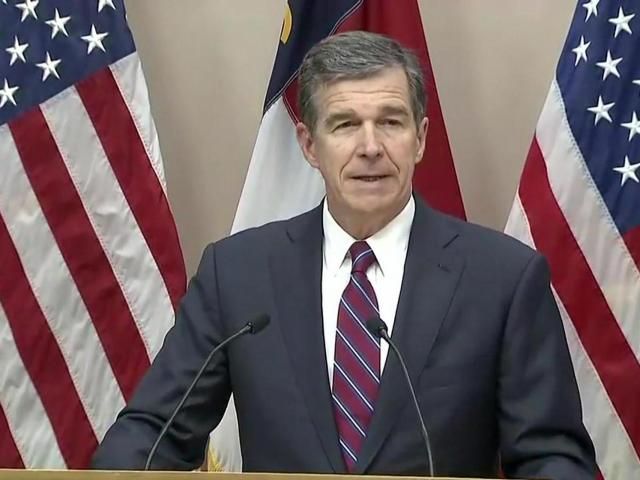Cooper’s European trip has one main goal: ‘Bring back jobs’

Going into a week-long economic development trip to Europe, North Carolina Gov. Roy Cooper has one simple goal: “Bring back jobs that will put money in the pockets of North Carolina families,” Cooper told WRAL in an interview Thursday. “And we’ve seen that foreign direct investments from companies all over the world have already been doing that.”
Cooper and officials from the North Carolina Department of Commerce and the Economic Development Partnership of North Carolina on Friday are scheduled to begin a series of economic development meetings in France, Germany and Switzerland.
The delegation is expected to meet with more than a dozen companies, plus regional trade associations and senior government officials in an attempt to woo investment and jobs to North Carolina. The officials plan to return May 31.
Many of the companies have been in discussion with the state about possible expansions, and Cooper says that showing up in person can be the difference between choosing North Carolina over another country or U.S. state. “Now is the time for us to make sure that when they do consider expanding or coming for the first time to the United States, that they pick North Carolina,” Cooper said.
More than 1,700 foreign companies operate in North Carolina, where they employ more than 300,000 people. Germany is the second-largest source of foreign direct investment in North Carolina behind Japan, with Switzerland and France the 5th and 12th largest, respectively, the governor’s office said.
State officials are trying to replicate the success of other international recruiting trips. Cooper’s recent travels to Japan have helped attract thousands of manufacturing jobs to the state. After Cooper’s most recent trip to Tokyo, in October, Toyota announced it would more than double the size of a massive electric vehicle battery factory in Randolph County. The company’s $14 billion factory, which is between Greensboro and Pittsboro, is expected to eventually employ more than 5,000 people — an investment that is expected to spur residual growth of contractors and services in the area.
“These companies coming here and creating these very high paying jobs not only provides jobs for our families,” Cooper said. “But It allows other companies to spring up and allow small businesses to get in on the action. And we know from our analysis that, at the end of the day, the economy is going to improve in North Carolina because these companies are coming here.”
For instance, Fujihatsu & Toyotsu Battery Components, a partnership between Fujihatsu Tech America and Toyota Tsusho America, said in February it would create 133 new jobs in a new electric vehicle battery manufacturing facility in Liberty. FTBC is investing $60 million in the project, which will support Toyota’s battery manufacturing unit.
State business recruiters have relied on a simple sales pitch — highlighting a strong workforce, good schools, solid infrastructure and business friendly policies. They also lean on the state’s No. 1 ranking in CNBC’s most recent list of best places to do business as they seek to lure businesses in the biotech, aerospace and clean energy sectors. The Europe trip could result in more of those jobs.
“North Carolina’s carving out a real niche in all of these areas and we’re becoming known across the world as an epicenter for these kinds of industries,” Cooper said.
Between 2018 and 2022, German companies invested more than $500 million and created more than 1,500 jobs in North Carolina. In recent months, the state has announced hundreds of millions of dollars in investments from German firms and other European companies — projects that are expected to add billions of dollars to the state’s economy.
Geneva, Switzerland-based cigarette maker JT International said this month that it would move its U.S. headquarters from New Jersey to Raleigh — a deal that is expected to bring more than 100 jobs to the city.
In March, Schott Pharma, a unit of Mainz, Germany-based Schott AG, said it would build a $371 million factory in Wilson, where it plans to hire about 400 people.
German manufacturer Siemens Energy said in February that it planned to add 559 jobs and invest almost $150 million in North Carolina over the next five years. Also in February: Belgium-based Drylock Technologies said it would create 113 new jobs in Rockingham County.
And in January, German electrical engineering company Dehn Inc. said it planned to open a U.S. headquarters employing almost 200 people in Iredell County.
In the week ahead, Cooper and economic officials hope to grow the list. “Building that foundation … can make a real difference and making sure that companies come here,” Cooper said.
Related
ForexLive European FX news wrap: Euro stays buoyed, markets wait…
Headlines:Markets:EUR leads, AUD lags on the dayEuropean equities lower; S&P 500 futures up 0.1%US 10-year yields down 2.7 bps to 4.255%Gold up 0.4% to $2,9
European shares fall as tariff uncertainties weigh; US jobs data…
(Reuters) - European shares fell on Friday as frequent shifts in U.S. trade policy throughout the week resulted in risk aversion, while focus remained on th
US economy added 151,000 new jobs in February; Euro on…
US jobs report releasedNEWSFLASH: Hiring across the US economy picked up slightly at the start of Donald Trump’s second term in office.The US economy added 15












